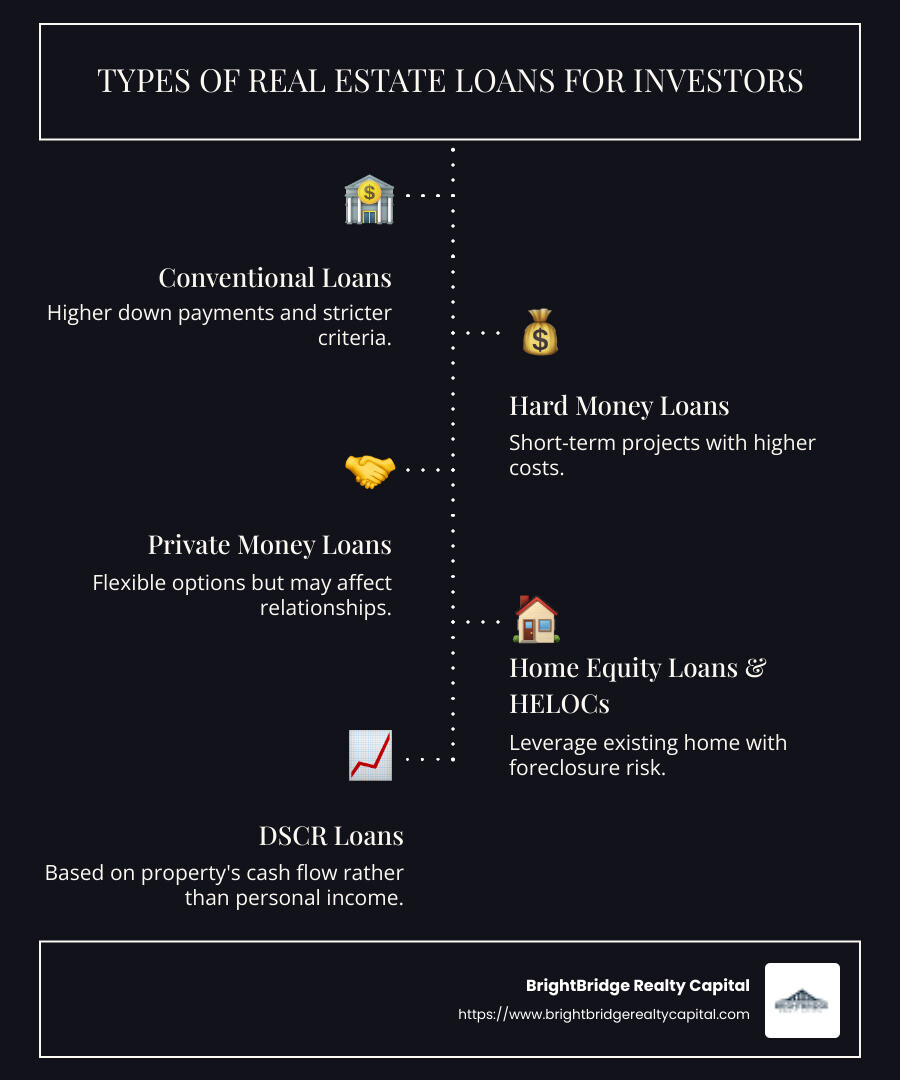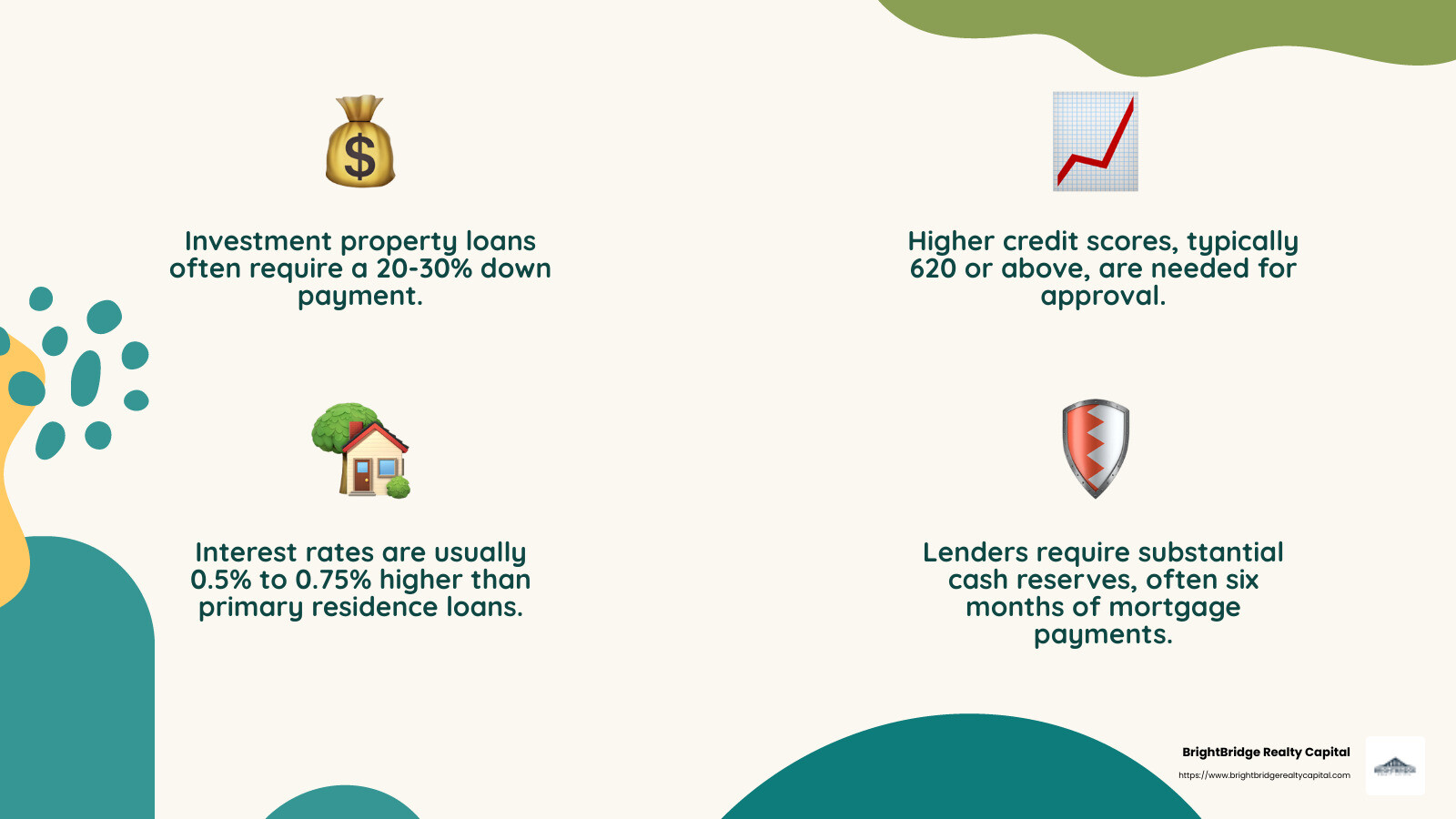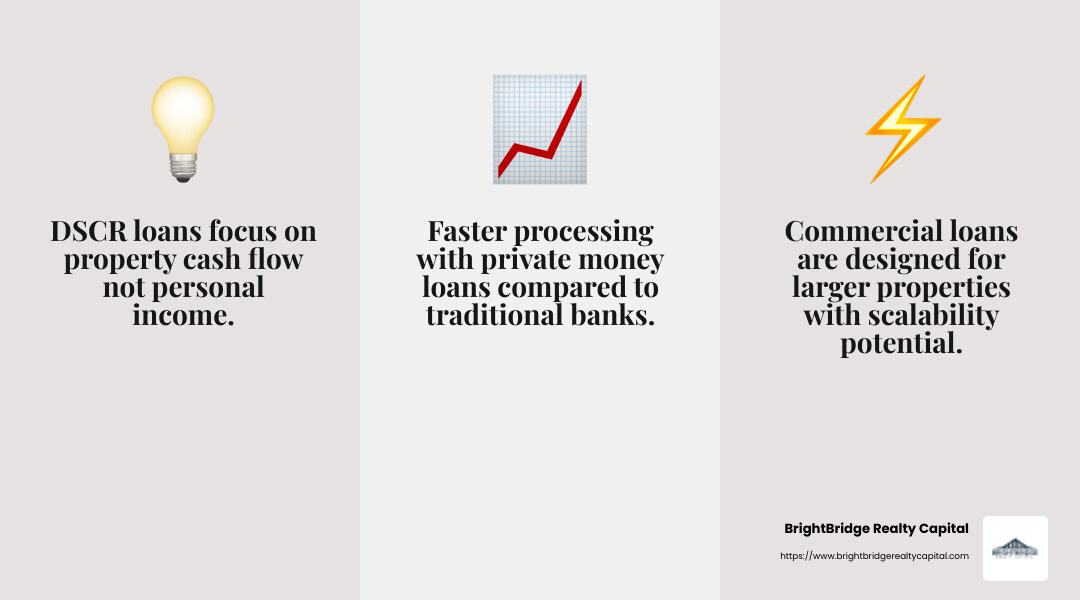The Investor's Edge: Navigating Real Estate Loans

Real estate loans for investors are a powerful pathway to wealth creation and portfolio diversification. Whether you're looking to jump into a fix-and-flip project or expand your rental holdings, financing options can open doors to new opportunities. But navigating this landscape requires careful strategizing and understanding of the options available to you.
Here’s a quick snapshot for those eager to find the right path:
- Conventional loans: Typically require higher down payments and stricter criteria.
- Hard money loans: Great for short-term projects but come with higher costs.
- Private money loans: Offer flexibility but can impact personal relationships.
- Home equity loans and HELOCs: Leverage your current home but come with foreclosure risk.
Investment properties offer steady cash flow, potential property appreciation, tax benefits, and portfolio diversification. They can also be financed with leverage, allowing you to control valuable assets with a smaller upfront cash outlay. This leverage, combined with the right financing strategy, can transform your investment ventures into lucrative undertakings. Carefully considering each loan option and understanding their pros and cons will ensure you capitalize on the best opportunities without unnecessary risks. Let's explore these in detail.

Easy Real estate loans for investors word list:
Understanding Real Estate Loans for Investors
When it comes to real estate loans for investors, understanding the nuances of investment property financing is key. Unlike loans for primary residences, investment property loans typically demand higher down payments and come with stricter credit requirements. Here's a closer look at what to expect:
Higher Down Payments
Investment properties are considered riskier by lenders, which is why they usually require larger down payments. Expect to put down 20-30% of the property's value. This is significantly more than the 3-5% often needed for a primary home. The benefit? A larger down payment can sometimes help you secure a better interest rate, as it reduces the lender's risk.
Stricter Credit Requirements
Your credit score is a critical factor when applying for an investment property loan. Lenders often look for higher credit scores compared to those required for a primary residence. A score of 620 might be the minimum with a 25% down payment, but if you're putting down just 15%, you might need a score of 680 or higher.
Why the strict standards? Lenders want assurance that you can manage the additional financial burden. They need confidence that you can cover mortgage payments and other expenses, even if your rental income fluctuates.
Loan Features and Approval
Investment property loans usually come with higher interest rates. They might be 0.5% to 0.75% more than loans for owner-occupied homes. Lenders also expect you to have substantial cash reserves. It's common for them to require six months or more of mortgage payments in reserve. This ensures you can keep up with payments, even if the property isn't generating income right away.
Moreover, lenders often assess the property's potential rental income. They want to see that the expected rental income will exceed your monthly mortgage payment by a certain percentage. This income-based approval helps ensure the property can sustain itself financially.

In summary, securing a loan for an investment property involves navigating stricter criteria and higher financial commitments. But for those ready to meet these challenges, the potential rewards—like steady cash flow and property appreciation—can be significant. Let's dig deeper into the types of loans available for real estate investors.
Types of Real Estate Loans for Investors
When diving into real estate loans for investors, it's crucial to know your options. Different loan types cater to different investment strategies and financial goals. Let's break down the main options:
Conventional Loans
Conventional loans are the go-to for many real estate investors. These loans are not backed by the government and typically follow guidelines set by Fannie Mae or Freddie Mac.
Pros:
- Lower Interest Rates: Investors with good credit can secure competitive rates.
- Flexibility: Suitable for primary residences, second homes, or investment properties.
Cons:
- Higher Down Payments: Usually requires 20% or more for investment properties.
- Stricter Qualifications: Higher credit scores and lower debt-to-income ratios are often needed.
Hard Money Loans
Hard money loans are short-term, asset-based loans. They are ideal for investors needing quick financing, often used for fix-and-flip projects.
Pros:
- Quick Approval: Fast processing, often within days.
- Less Stringent Credit Requirements: Lenders focus more on property value than credit score.
Cons:
- Higher Costs: Interest rates and fees are typically higher.
- Short Term: Usually requires repayment within a year or two.
Private Money Loans
Private money loans come from individuals or private companies. They offer flexibility and are often used when traditional financing isn't an option.
Pros:
- Negotiable Terms: Flexible terms custom to the investor's needs.
- Faster Processing: Less bureaucracy compared to banks.
Cons:
- Higher Interest Rates: Typically higher to compensate for increased risk.
- Potential Relationship Strain: Borrowing from friends or family can lead to personal issues.
DSCR Loans
Debt Service Coverage Ratio (DSCR) loans focus on the property's cash flow rather than the borrower's income. They are popular among investors with multiple properties.
Pros:
- Income Flexibility: Based on rental income, not personal income.
- Faster Approvals: Quicker than traditional loans.
Cons:
- Higher Interest Rates: Due to perceived risk.
- Stricter Property Analysis: Approval hinges on the property's earning potential.
Commercial Loans
Commercial loans are designed for larger properties or multi-unit buildings. They often come with different terms and conditions than residential loans.
Pros:
- Scalability: Suitable for larger investments and portfolios.
- Potential for Lower Rates: Depending on the borrower's profile and property type.
Cons:
- Complex Application Process: More documentation and scrutiny.
- Higher Down Payments: Often 25% or more.

In conclusion, choosing the right real estate loan for investors is about aligning your financial strategy with the loan type that best suits your needs. Whether you're a first-time investor or expanding your portfolio, understanding these loan types can give you a competitive edge. Next, let's explore the benefits and risks associated with these loans.
Benefits and Risks of Real Estate Loans
Investing in real estate can be a smart way to build wealth, but it comes with its own set of benefits and risks. Understanding these can help investors make informed decisions.
Benefits
Steady Cash Flow
One of the biggest advantages of owning rental properties is the potential for steady cash flow. Properties in good locations can generate consistent rental income, which can help cover mortgage payments and other expenses. This income can also provide a reliable source of passive income with minimal involvement.
Property Appreciation
Real estate has historically appreciated over time. For example, since 1963, home prices in the U.S. have increased by over 5.5% annually, outpacing inflation. This means that your property value could increase, adding to your overall wealth.
Tax Benefits
Owning investment properties offers several tax advantages. You can deduct mortgage interest, depreciation, maintenance costs, and property taxes, which reduces your taxable income. Strategies like 1031 exchanges can defer capital gains taxes when reinvesting in new properties.
Portfolio Diversification
Real estate can diversify your investment portfolio, reducing risk. Unlike stocks, real estate values often move independently, meaning properties can hold or even gain value during stock market downturns.
Leverage
With real estate loans, you can use leverage to control high-value assets with a small down payment. As tenants pay rent, they help pay down your mortgage, building equity over time. This can lead to a healthy return on investment, even if property values don't skyrocket.
Risks
Market Fluctuations
While real estate generally appreciates, markets can fluctuate. Economic downturns or changes in local markets can affect property values and rental income.
High Initial Costs
Investors need significant upfront capital. Higher down payments and closing costs can strain finances, especially if unexpected repairs or vacancies occur.
Interest Rate Increases
Rising interest rates can increase mortgage payments, affecting cash flow. It's crucial to factor in potential rate hikes when planning investments.
Property Management
Managing rental properties requires time and effort. From tenant issues to maintenance, being a landlord isn't always passive. Some investors hire property managers, but this adds to expenses.
In summary, real estate loans for investors offer opportunities for wealth-building through steady cash flow, appreciation, and tax benefits. However, they also come with risks like market fluctuations and high initial costs. Understanding these aspects can help you steer the complexities of real estate investing.
Next, we'll dive into key considerations when securing real estate loans, including credit scores and down payments.
Real Estate Loans for Investors: Key Considerations
When diving into real estate loans for investors, there are some crucial factors to consider. These elements can significantly impact your ability to secure a loan and the terms you'll receive.
Credit Score
Your credit score is a big deal. Lenders use it to decide if you're a good risk. For investment property loans, a higher credit score is usually required compared to loans for primary residences. Typically, you need at least a 620 score if you're putting down 25%, but a 680 if your down payment is only 15%. A better score can also help you snag a lower interest rate, saving you money over time.
Down Payment
Investment properties often require a larger down payment. While primary homes might only need 3-5% down, investment properties usually demand at least 15-25%. This means you'll need more cash upfront. The higher down payment helps reduce the lender's risk, but it can be a barrier if you don't have the cash available.
Interest Rates
Interest rates on loans for investment properties are generally higher than those for primary residences. Expect rates to be about 0.5% to 0.75% higher. This is because lenders see investment properties as riskier. Even a small increase in the interest rate can significantly affect your monthly payments and the overall cost of the loan.
Cash Reserves
Lenders often require you to have cash reserves. This means having enough money set aside to cover several months of mortgage payments, even if your property is vacant or not generating income. Having a cushion of six months' worth of payments is a common requirement. This gives lenders confidence that you can handle the loan even during tough times.
Rental Income
Rental income is a key factor. Lenders may let you use 75% of the anticipated rental income to help you qualify for a loan. This can boost your qualifying income, making it easier to secure financing. However, you'll need documentation, like a current lease agreement or an appraiser's rental income estimate, to support this.
Understanding these considerations can make a big difference in navigating the loan process. A solid credit score, a substantial down payment, and adequate cash reserves are crucial. Meanwhile, being aware of interest rates and leveraging rental income can optimize your investment strategy. Up next, we'll tackle some common questions about securing loans for investment properties.
Frequently Asked Questions about Real Estate Loans for Investors
What type of loan is best for investment property?
Choosing the best loan type for your investment property depends on your specific goals and financial situation. Here's a quick look at some common options:
Conventional Loans: These are great if you have a strong credit score and can afford a larger down payment. They typically offer lower interest rates and longer terms.
Hard Money Loans: Perfect for short-term investments like flipping houses. They provide quick access to funds but come with higher interest rates and fees.
Private Money Loans: These are flexible and can be custom to your needs. However, they often rely on personal connections and can strain relationships if not managed carefully.
DSCR Loans: Ideal for investors who want to qualify based on rental income. These loans focus on the property's ability to generate income rather than your personal income.
Your choice should align with your investment goals, whether it's generating steady rental income, flipping a property for profit, or diversifying your portfolio.
How to get a loan for a rental property with no money down?
Getting a loan with no money down can be tricky, but there are creative solutions:
House Hacking: Buy a multi-unit property with a low-down-payment FHA loan, live in one unit, and rent out the others.
Seller Financing: Negotiate with the seller to finance the purchase. This can eliminate the need for a traditional mortgage.
Partnerships: Team up with an investor who can provide the down payment in exchange for a share of the profits.
Home Equity Loans or HELOCs: Use the equity in your primary residence to fund the down payment on an investment property.
These strategies require careful planning and negotiation, but they can help you enter the real estate market without a large upfront investment.
What are the requirements for an investment property loan?
Securing an investment property loan comes with specific requirements:
Credit Score: Aim for a score of at least 620, but higher scores can get you better terms.
Down Payment: Expect to put down at least 15-25%. A larger down payment can reduce your interest rate and monthly payments.
Cash Reserves: Lenders often require reserves to cover several months of mortgage payments. This ensures you can handle costs even if the property isn't producing income.
Rental Income Documentation: If using rental income to qualify, you'll need proof such as a lease agreement or an appraiser's estimate.
Meeting these requirements can improve your chances of securing a loan and getting favorable terms. Understanding these elements will help you prepare and strategize effectively for your investment journey.
Conclusion
In the world of real estate investing, having a reliable financial partner can make all the difference. BrightBridge Realty Capital stands out in the industry by offering fast closings and direct lending solutions custom for investors. Our approach eliminates the middleman, allowing us to provide competitive rates and a seamless process.
With locations in New York, we are positioned to serve investors nationwide, ensuring you have the capital you need when opportunities arise. Our unique selling proposition is our ability to close deals often within a week, a crucial advantage in a market where timing is everything.
Whether you're looking to expand your rental portfolio or start on a new construction project, we are here to support your journey with flexible funding options. Our expertise in real estate loans for investors ensures you can focus on what you do best—growing your investment portfolio.
Explore our customized financing solutions and experience the BrightBridge difference. Learn more about our services and take the next step in your real estate investment journey today.


